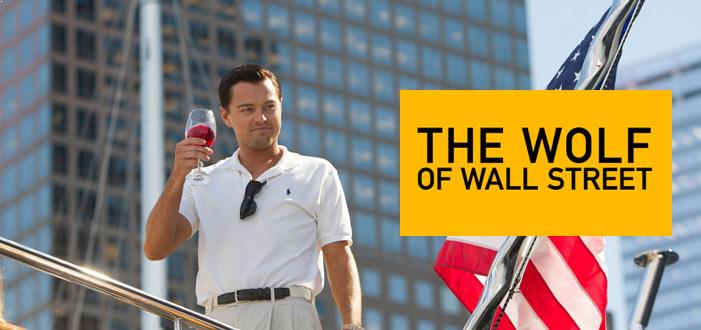
The Wolf of Wall Street
Martin Scorsese is a master at taking the raunchy and making it artful, like crafting a sculpture out of a bin of rotten garbage. The assembly pieces of rotten banana peels and plastic soda can rings in this instance is by coincidence a group of Wall Street stock brokers.
I say by coincidence, because it is not as if the intention of this film was to criticize that particular class of professionals who move money from one side of the desk to the other for people who need their money managed. That is to say, the film does not generally criticize the financial professional who assists those who are hungrier for greater returns on their surplus income than what the safety of a mom and pop bank can provide even if the difference is just a few more percentage points of earnings that merits the risk of being exposed to a stock market crash, with the licensed professionals in the security industry skimming a few dollars off the top for themselves for the services rendered. This is not Oliver Stone’s Wall Street, which poignantly arrived in the late 80’s as the mergers and acquisitions trade arose, dismantling the inefficiencies of corporate bureaucracy, a financial innovation that created the image of a Gordon Gecko predator feasting on the tender lamb meat of the workers of the world who, while protected from the comfort and shelter of their feudal incorporated lords, were sluggishly slowing down the disruptive and rapaciously innovative drive that capital has. On the surface, Stone’s Wall Street was the original 99% vs. 1% critique.
The Wolf of Wall Street, by contrast, is self-contained. It does not preach, it does not moralize. It is an isolated anecdote of the spill-over effect of the 80’s renaissance, if not great awakening, of the financial world. In this world, the goal while all the same is childishly simple: get rich. The young who flock to downtown Manhattan wear it on their sleeves, unashamed at their desirous hunger which may be too unseemly in other cultures. In aggregate, with the stakes on the line, the strongest that survive have to be psychologically in their own class.
At that is what Wolf portrays more than anything, from the first day the protagonist Jordan [last name] rolls onto the street, during the entire ride, when Jordan becomes a mess by any other standard, and has to find was to cope. Coping from what? Not guilt from bilking the 1%, which is how his business explodes. But from the crazed intensity of trying to make – or rather take – that money.
We can see then that the bloviated hedonism on display throughout the film is an accoutrement to the lifestyle of pursuing money for money’s sake. The drive in other words is a base instinct, and thus the other instincts for gluttony and lust are unsurprisingly also parallel company. True, the narrative of the 2008 financial crisis is that Wall Street was the main culprit. But that is a false construction, as it took two – the other being the homeowners trying to buy homes they could not afford – to tango. Thus, The Wolf of Wall Street focuses more on the consequences of a decrepit culture, one that emerges when wealth is no longer the reserve for aristocrats and monarchs, but anyone. That truth – that high culture is dead – is a result of both capitalism’s strength and weakness, and is perfectly captured with this film.
Grade: A-

